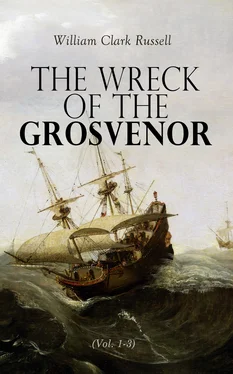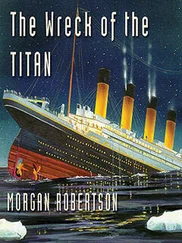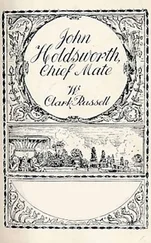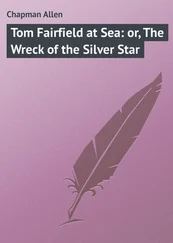The moment Coxon saw me he told me to go forward and set all hands to close-reef the fore-topsail. I did his bidding, calling out the order as I went stumbling and sprawling along the main-deck, and letting go the halliards to wake up the men, after groping for them. Indeed, it was pitch dark forward. I might have been stone-blind for anything I could see, barring the thin rays of the forecastle lamp glimmering faintly upon a few objects amidships.
Owing to this darkness it was a worse job to reef the topsails than had it been blowing a hurricane in daylight. It was a quarter to one before both sails were reefed, and then the watch that had been on deck since eight o'clock turned in.
Here were we now under almost bare poles, in a dead calm; and yet had the skipper ordered both the fore and mizzen topsails to be furled, he would not have been doing more than was justified by the extraordinary character of the night—the strange and monstrous sub-swell of the ocean, the opacity of the heavens, the sinister and phenomenal breathlessness and heat of the atmosphere.
Duckling was below, lying at full length upon one of the cuddy benches, ready to start up at the first call. I glanced at him through the skylight, and wondered how on earth he kept himself steady on his back. I should have been dislodged by every roll as surely as it came. Perhaps he used his shoulder-blades as cleats to hold on to the sides of the bench; and to so wildly proportioned a man as Duckling, a great deal was possible.
The card was swinging in the binnacle as before, and just now the ship's head was north-west. With more canvas upon the vessel her position would have been perilous by the impossibility of guessing from what quarter the wind would come—if it came at all. Even to be taken aback under close-reefed topsails might prove unpleasant enough, should a sudden gale come down and find the ship without way on her.
The captain, who was on the starboard side of the wheel, called me over to him.
"Are the decks clear?"
"All clear, sir."
"Fore-topsail sheets?"
"Ready for running, sir."
"How's her head now?" to the man at the helm.
"Nor'-west, half north."
"Keep a brisk look-out to the south'ard, sir," he said to me; "and sing out if you see the sky clearing."
I saw him, by the binnacle-light, put his finger in his mouth and hold it up. But there was no other air to be felt than the short rush first one way, then another, as the ship rolled.
Scarcely ten minutes had passed since he addressed me, when I saw what I took to be a ship's light standing clear upon the horizon, right astern.
I was about to call out when another light sprang up just above it. Then a small, faint light, a little to the westward of these, then another.
Owing to the peculiar character of the atmosphere these lights looked red, and so completely was I deceived by their appearance, that I halloed out—
"Do you see those lights astern, sir? They look like a fleet of steamers coming up."
But I had scarcely spoken when I knew that I had made a fool of myself. They were not ships' lights, but stars , and at once I comprehended the import of this sudden astral revelation.
"Stand by the starboard braces!" roared the skipper; and the men, awake to a sense of a great and perhaps perilous change close at hand, came shambling and stumbling along the deck.
A wonderful panorama was now being rapidly unfolded in the south.
All down there the sky was clearing as if by magic, and the stars shining; but as I watched, great flying wreaths like mighty volumes of smoke pouring out of gigantic factory chimneys, came rushing over and obscuring them, though always leaving a few brightly burning in a foreground which advanced with astonishing rapidity towards the ship. To right and left of this point of the horizon, the sky cleared only to be obscured afresh by the flying clouds. Soon, amid the solemn pauses falling upon the ship between the intervals of her pitching, for she had now swung right before the swell, we could hear the coming whirlwind screeching along the surface of the water. The contrast of its approach with the oily, breathless, heaving surface of the sea around us and all ahead, and the utter stagnation of the air, produced an effect upon my mind, and, I believe, upon the minds of all others who were witnesses of the sight, to which no words could give expression—an emotion, if you like, of suspense that was almost terror, and yet terror deprived of pain by a wild and tingling curiosity.
But such a gale as I am describing travels quickly: all overhead the sky was first cleared and then massed up with whirling clouds, before the wind struck us: the white surface of the sea, cleanly lined like the surf upon a beach, was plainly seen by us, even when the water all around was still unruffled; and then , with a prolonged and pealing yell, the gale and the spray it was lashing out of the sea were upon us. In a moment our decks were soaking—the masts creaked, and every shroud and stay sang to the sudden, mighty strain; the vessel staggered and reeled—stopped, as a heavy swell rolled under her bows, and threw her all aslant against the hurricane, which screeched and howled through the rigging, and then fled forwards under the yards, which had squared themselves as the starboard braces were slackened.
It was lucky for the Grosvenor that the gale struck her astern. So great was its fury that, had it taken her aback, I doubt if she would have righted.
This furious wind had cleared the horizon, and the water-line all around was distinctly figured against the sky. The sea was a sheet of foam, and, what will scarcely seem credible, the swell subsided under the lateral pressure of the wind, so that for a short time we seemed to be racing along a level surface of froth. Large masses of this froth, bubbly and crackling like wood in a fire, were jogged clean off the water and struck the decks or sides of the ship with reports like the discharge of a pistol, and no more than a handful of water blown against my face hit me with such force, that for some moments I suffered the greatest torment, as though my eyes had been scalded, and I hardly knew whether I had not lost my sight.
The wind was blowing true from the south and we were bowling before it due north, losing as much ground every five minutes as had taken us an hour to get during the day. Coxon, however, was feeling the gale before he brought the ship close: at any moment, you see, the wind might chop round and blow a hurricane; though, to be sure, the sky with its torn masses of skurrying clouds had too wild an aspect to make us believe that this gale was likely to be of short duration.
The sea now began to rise, and it was strange to watch it. First it boiled in short waves which the wind shattered and blew flat. But other waves rose, too solid for the wind to level: they increased in bulk as they ran, and broke in coils of spray, while fresh and larger waves succeeded, and the ship began to pitch quickly in the young sea.
The wonderful violence of the wind could not be well appreciated by us who were running before it; but when the crew manned the braces and the helm was put to starboard, it seemed as if the wind would blow the ship out of the water. She came to slowly, laying her main-deck level with the sea, and the screeching of the wind was diabolical and absolutely terrifying to listen to. With the weather leeches just lifting, she was still well away from her course, and her progress under all three topsails was all leeway.
But I soon saw that she could not carry two of the three topsails, owing to the tremendous sudden pressure put upon the masts by her lurches to windward; and sure enough Duckling (who had turned out along with all hands when the gale had first struck the ship) roared through a speaking-trumpet to clew up and furl the fore and mizzen topsails.
Читать дальше












